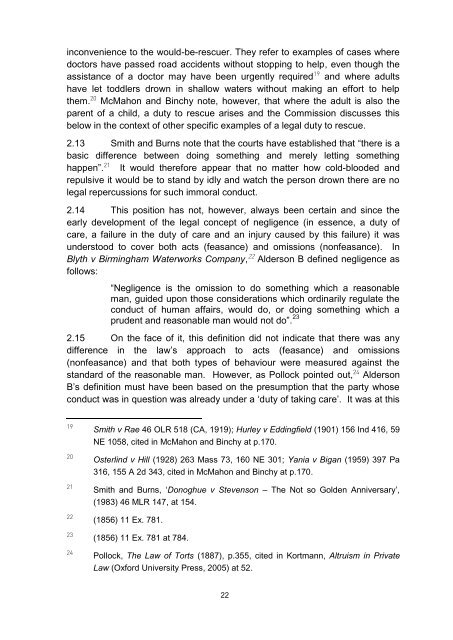civil liability of good samaritans and volunteers - Law Reform ...
civil liability of good samaritans and volunteers - Law Reform ...
civil liability of good samaritans and volunteers - Law Reform ...
Create successful ePaper yourself
Turn your PDF publications into a flip-book with our unique Google optimized e-Paper software.
inconvenience to the would-be-rescuer. They refer to examples <strong>of</strong> cases wheredoctors have passed road accidents without stopping to help, even though theassistance <strong>of</strong> a doctor may have been urgently required 19 <strong>and</strong> where adultshave let toddlers drown in shallow waters without making an effort to helpthem. 20 McMahon <strong>and</strong> Binchy note, however, that where the adult is also theparent <strong>of</strong> a child, a duty to rescue arises <strong>and</strong> the Commission discusses thisbelow in the context <strong>of</strong> other specific examples <strong>of</strong> a legal duty to rescue.2.13 Smith <strong>and</strong> Burns note that the courts have established that “there is abasic difference between doing something <strong>and</strong> merely letting somethinghappen”. 21 It would therefore appear that no matter how cold-blooded <strong>and</strong>repulsive it would be to st<strong>and</strong> by idly <strong>and</strong> watch the person drown there are nolegal repercussions for such immoral conduct.2.14 This position has not, however, always been certain <strong>and</strong> since theearly development <strong>of</strong> the legal concept <strong>of</strong> negligence (in essence, a duty <strong>of</strong>care, a failure in the duty <strong>of</strong> care <strong>and</strong> an injury caused by this failure) it wasunderstood to cover both acts (feasance) <strong>and</strong> omissions (nonfeasance). InBlyth v Birmingham Waterworks Company, 22 Alderson B defined negligence asfollows:“Negligence is the omission to do something which a reasonableman, guided upon those considerations which ordinarily regulate theconduct <strong>of</strong> human affairs, would do, or doing something which aprudent <strong>and</strong> reasonable man would not do”. 232.15 On the face <strong>of</strong> it, this definition did not indicate that there was anydifference in the law‟s approach to acts (feasance) <strong>and</strong> omissions(nonfeasance) <strong>and</strong> that both types <strong>of</strong> behaviour were measured against thest<strong>and</strong>ard <strong>of</strong> the reasonable man. However, as Pollock pointed out, 24 AldersonB‟s definition must have been based on the presumption that the party whoseconduct was in question was already under a „duty <strong>of</strong> taking care‟. It was at this192021222324Smith v Rae 46 OLR 518 (CA, 1919); Hurley v Eddingfield (1901) 156 Ind 416, 59NE 1058, cited in McMahon <strong>and</strong> Binchy at p.170.Osterlind v Hill (1928) 263 Mass 73, 160 NE 301; Yania v Bigan (1959) 397 Pa316, 155 A 2d 343, cited in McMahon <strong>and</strong> Binchy at p.170.Smith <strong>and</strong> Burns, „Donoghue v Stevenson – The Not so Golden Anniversary‟,(1983) 46 MLR 147, at 154.(1856) 11 Ex. 781.(1856) 11 Ex. 781 at 784.Pollock, The <strong>Law</strong> <strong>of</strong> Torts (1887), p.355, cited in Kortmann, Altruism in Private<strong>Law</strong> (Oxford University Press, 2005) at 52.22
















